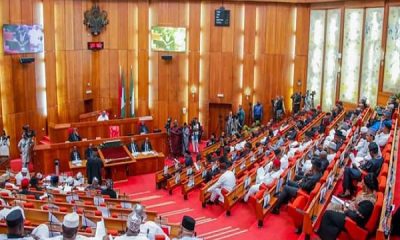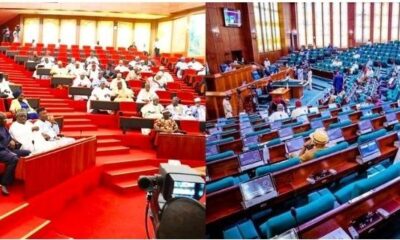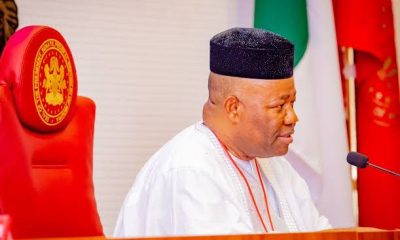Headline
Senate to screen ministerial nominees on Monday

The Senate says it will on Monday begin the screening of the 28 ministerial nominees proposed by President Bola Tinubu.
Spokesperson of the Senate, Sen. Adeyemi Adaramodu (APC-Ekiti), disclosed this while addressing newsmen after the list of the nominees was read in the upper chamber on Thursday.
Adaramodu said that although the Senate was not supposed to sit on Mondays, but because of the importance attached to this national assignment, “we have suspended all our rules for them to commence the exercise next Monday”.
He assured that the screening would be thorough because the lawmakers were very much aware of the high expectations of those who would assist President Bola Tinubu in fulfillment of his mandate and the constitution.
“The Senate is going to examine the character, personality, the experiences, the background of every nominee and we believe at the end of it, Nigerians will not be disappointed.
“We expect that the Federal Executive Council (FEC) that will be constituted after the screening is going to be the one that will breathe oxygen into the comatose economy of Nigeria.
“The list is here, until they come forward with their resume, it’s not going to be a shadow screening that you have a very good resume, you don’t have the character to carry the resume.
“You must have the character and you must have the mental ability to be able to be part of that cabin crew that is going to fly the aircraft of the success of Nigeria.
“To satisfy the expectations of Nigerians for high velocity performance, we will eyemark, not earmark the performances.”
He said that there would be no allocation of time for any nominee and “if a single nominee takes up to three hours or a whole day, so be it.”
On allegation on some nominees like former governors with EFCC cases, Adaramodu said all the nominees had gone through security screening checks from the executive.
“However, if there is any red flag raised, we will look into it, Nigerians will never be disappointed by the 10th Senate.”
Meanwhile, with the screening commencing on Monday, the annual recess of the National Assembly, which would have begun on Thursday, has been put on hold till after the exercise.
Headline
Fagbemi warns against obstructing EFCC from performing its lawful duty

The Minister of Justice, Lateef Fagbemi, SAN has warned against obstructing the Economic and Financial Crimes Commission (EFCC) from carrying out its lawful duty .
Fagbemi’s warning is contained in a statement in Abuja.
“This is a matter of very grave concern, it is now beyond doubt that the EFCC is given power by the law to invite any person of interest to interact with them in the course of their investigations into any matter, regardless of status.
“Therefore, the least that we can all do when invited, is not to put any obstruction in the way of EFCC, but to honourably answer their invitation.
“A situation where public officials who are themselves subject of protection by law enforcement agents will set up a stratagem of obstruction to the civil and commendable efforts of the EFCC to perform its duty is to say the least, insufferably disquieting’’.
He added that running away from the law will not resolve issues at stake but only exacerbate them.
“Nigeria has a vibrant judicial system that is capable of protecting everyone who follows the rule of law in seeking protection.
“I therefore encourage anyone who has been invited by the EFCC or any other agency to immediately toe the path of decency and civility by honouring such invitation instead of embarking on a temporising self-help and escapism.
“This can only put our country in bad light before the rest of the world’’.
He said institutions of state should be allowed to function effectively and efficiently.
“I stand for the rule of law and will promptly call EFCC, and indeed any other agency to order when there is an indication of any transgressions of the fundamental rights of any Nigerian by any of the agencies’’.
NAN reports that the EFCC had on Wednesday warned members of the public that it was a criminal offence to obstruct officers of the Commission from carrying out their lawful duties.
Section 38(2)(a(b) of the EFCC Establishment Act makes it an offence to prevent officers of the Commission from carrying out their lawful duties. Culprits risk a jail term of not less than five years.
The warning , the EFCC said, became necessary against the background of the increasing tendency by persons and groups under investigation by the Commission to take the laws into their hands by recruiting thugs to obstruct lawful operations of the EFCC.
On several occasions, the anti graft agency said, operatives of the Commission have had to exercise utmost restraint in the face of such provocation to avoid a breakdown of law and order.
Headline
Unknown Gunmen Abduct Channelstv Reporter In Port-harcourt

Some unknown gunmen have kidnapped Joshua Rogers, the ChannelsTV reporter in Port-Harcourt, the Rivers State capital.
Politics Nigeria learnt that Rogers was picked up close to his residence at Rumuosi in Port Harcourt and to an unknown destination by the gunmen around 9pm on Thursday, April 11.
The reporter was driving his official ChannelsTV branded car when the hoodlums accosted, pointed a gun at him and took him away in the same vehicle.
Rogers was said to be returning from his official assignment in Government House after a trip to Andoni for a government event when the incident happened.
Already, the gunmen were said to have contacted his wife and demanded a N30million ransom for bis release.
His cameraman confirmed the incident and appealed to his abductors to set him free unconditionally.
















